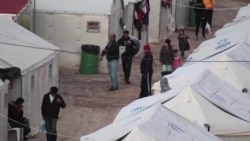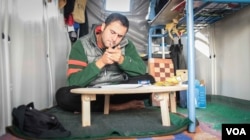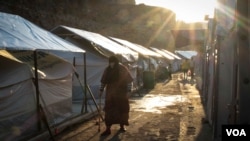Transformed into a holding pen by the European Union, tensions are escalating on the Greek island of Chios as both residents and refugees pay a heavy price.
Just over a week ago, brewing frustrations culminated in clashes breaking out in Souda refugee camp, which is home to about 800 people.
For two nights running, huge rocks and - some claim - molotov cocktails were thrown from the ancient walls of a castle onto refugees in the tents below, while a small number of Greeks and some residents of the camp clashed.
And with some still too fearful to sleep in the camp, which is in the island’s main town, there are now concerns that more violence could follow.
Always ready
“Now my bags, my money and my passport are always ready with me,” said Mohammed Al Jassem, who fled Syria and arrived in the camp eight months ago.
“The fascists could come at any time. At any time you could have a big problem,” he said, referring to the widespread belief that neo-fascist Greek political party Golden Dawn, which had a meeting on the island in the days meeting up to the clashes, was involved.
Jassem recalled rocks thudding onto paths and into tents near him as terrified families and children fled for their lives in the darkness of night.
He is desperate to move from the island to Europe, but cannot. Like the others here, he arrived too late.
Stemming the tide
Up till mid-March, more than 100,000 refugees had washed up in flimsy dinghies on Chios’ shores before quickly moving on to mainland Greece and into the rest of Europe.
However, on March 20 the EU-Turkey deal came into effect. It stemmed the number of refugees arriving in Europe and prevented people from moving on from the Greek islands until a decision was made about their asylum status.
Last Thursday, more violence broke out on Moria detention camp in Lesvos, another one of the islands affected, after a woman and her grandchild died in a gas stove explosion.
Though increasingly fragile, for now the deal still holds, and with the asylum process unable to keep up and people unable to move on, Chios and all the other Greek islands have become stretched well beyond capacity.
The consequences are becoming all too evident.
Souring relations
Since then, relations have gradually soured in Chios both within the camp and between the refugees and Greeks living on the island.
In Souda camp, alongside Syrians can be found many other nationalities - many of whom feel cheated by procedures and have no idea when, or if, they will be able to leave the island to continue on to mainland Greece.
Shortly after the deal, hundreds of refugees broke out of a detention center on the island, and in June in Souda tents belonging to humanitarian agencies burnt down amid protests in the camp.
“Refugees feel the process is discriminatory and unpredictable, and this generates a lot of tension among the refugee community,” explained the Norwegian Refugee Council’s Sebastien Daridan.
Layers of frustration
Those living in Chios were quick to help refugees even before NGOs arrived on the island, and many remain sympathetic.
But as petty crime has risen, so the island’s vital tourism economy has taken a hit, and patience is wearing thin.
Daridan said that both refugees and the islanders are victims, with Chios effectively “sacrificed” for the deal.
“You have, due to the asylum process, a situation which is unpredictable and explosive, meaning there are so many layers of frustration that anything can lead to any incident," he said.
Dearth of trust
In response, humanitarian workers on the ground told VOA that more needs to be done to improve integration between refugees and the local population if such attacks are to be avoided in the future.
But fractured relationships extend well beyond the island. Last week Greece’s minister for migration criticized local authorities on Chios for not approving the creation of another camp.
It was an accusation rejected by the deputy mayor George Karamanis, who said their trust, and that of the public, had been eroded amid a dearth of information and support from the state.
“They’ve decided the island is going to play an important role in stopping flows [of refugees],” he told VOA, “but the islands are not supported enough in order to play this role.”
Risk remains
All agree that something needs to change to avoid a repeat of what happened in Souda, and small tweaks have been made in the aftermath - the police, though they are widely distrusted by the refugees, have apparently stepped up patrols around the site.
But as long as islands like Chios remain under-resourced and overcapacity, with both camp residents and islanders deprived of information, the risk remains.
Niko, from Ghana, now sleeps in his brother 's tent. His own home of eight months was burnt down during the attacks.
“People are being kept on this island and being treated like animals,” he said. “But it’s like a dog - the more you cage it, the more it becomes wild.”













